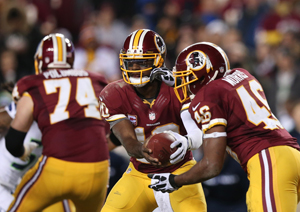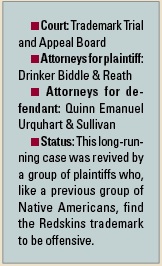News that a group of Native Americans in March had filed a complaint against the Washington Redskins started the latest iteration of this long-running controversy.
Five Native Americans filed the complaint at the Trademark Trial and Appeal Board, a federal agency that regulates trademarks such as the Redskins. The argument is not a new one: that the name Redskins is a disparaging term for Native Americans, and U.S. law prevents the board from granting disparaging trademarks.
That argument won in 1999 at the same board, but a court overturned the decision in 2003 on a technicality. The court ruled that the plaintiffs had waited too long since the 1967 trademark license to file their complaint. So now a new group of younger plaintiffs has filed a complaint, perhaps immune from that technicality. They initially filed their case in 2006, but it was stayed while an appeal of the 2003 decision worked through the courts.
“The strategy this time was to get more age-appropriate plaintiffs so the cause of action
 |
| Photo by: Getty Images |
won’t be thrown out,” said Ken Shropshire, an attorney with Duane Morris who teaches a course on sports law and business at Wharton.
The appeals board could take more than a year to make a decision, and then require the plaintiffs or the Redskins to conduct surveys on how the name is viewed. A 2002 Sports Illustrated poll found that most Native Americans did not find the term to be offensive.
In her 2003 decision overturning the appeals board, U.S. District Judge Colleen Kollar-Kotelly ruled the plaintiffs had not offered enough evidence that the term Redskins was offensive.
If that is the end result of this latest effort, it could mean legal assaults on team names as offensive may have run their course.
Even if the appeals board ruled for the plaintiffs, the Redskins would then appeal that ruling. But if the Redskins were to lose this time, it would mean they would no longer own the exclusive rights to their logo and name, which in theory could prove costly. That said, the team could at that point make a common law push that it has used the name for so long, the lack of trademark rights is irrelevant, Shropshire said.
Given the lengthy legal process, Shropshire said, the only way the team name changes is for business reasons. For example, he explained, if the team wants a new stadium and a municipality, like the District of Columbia, preconditions a stadium deal on a name change.





